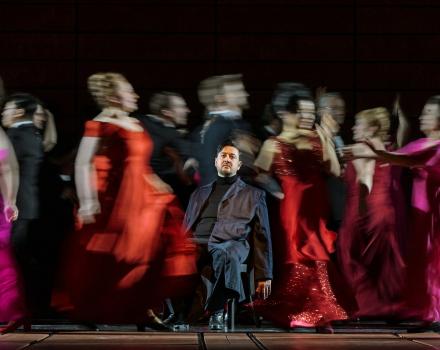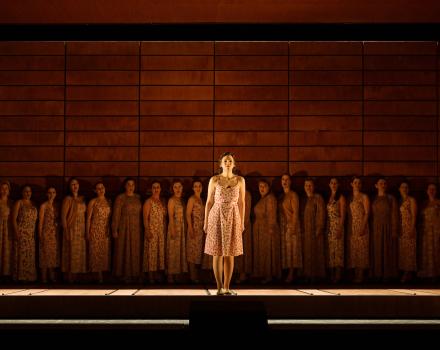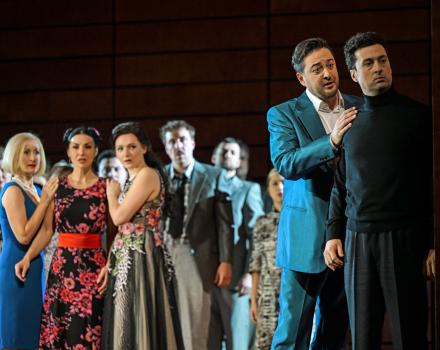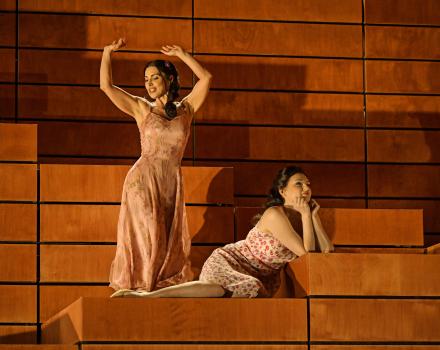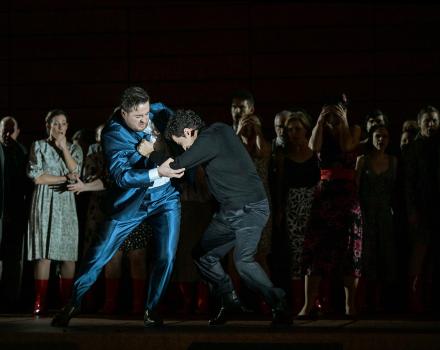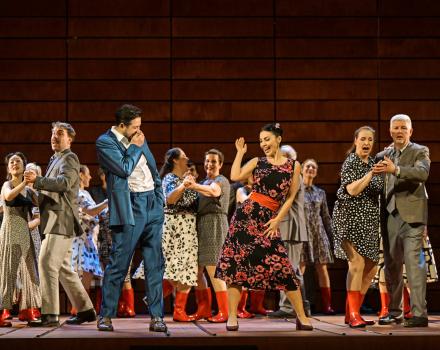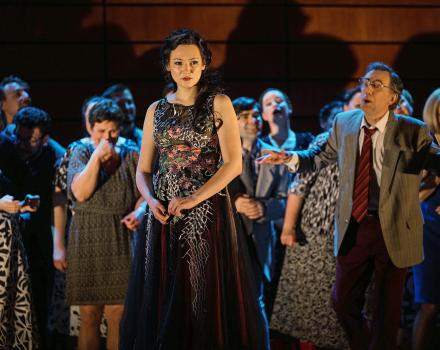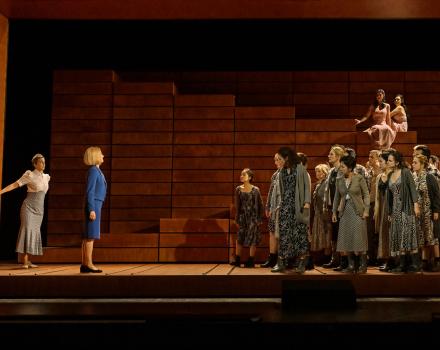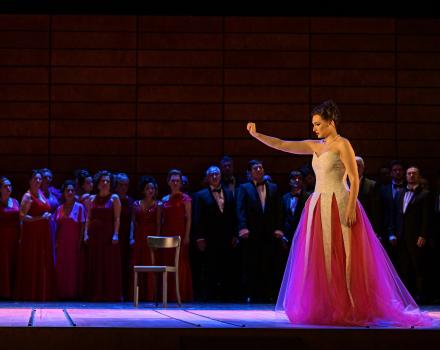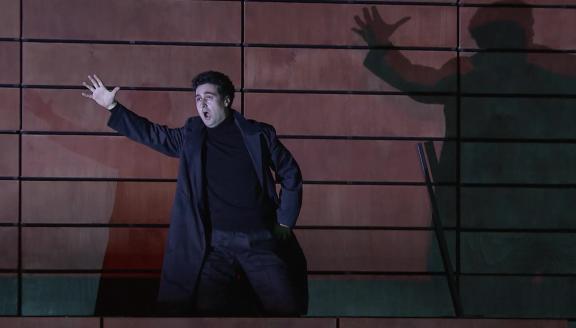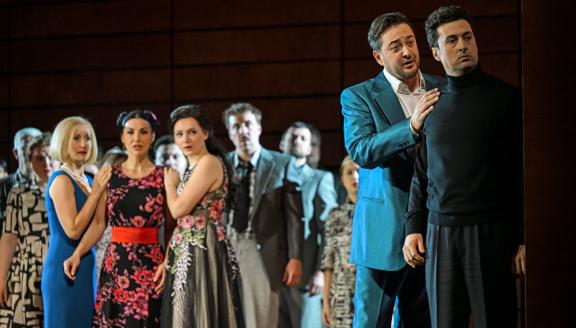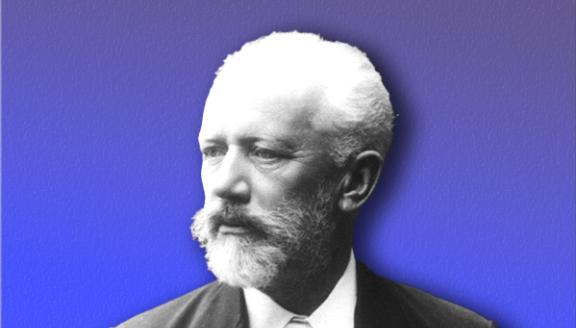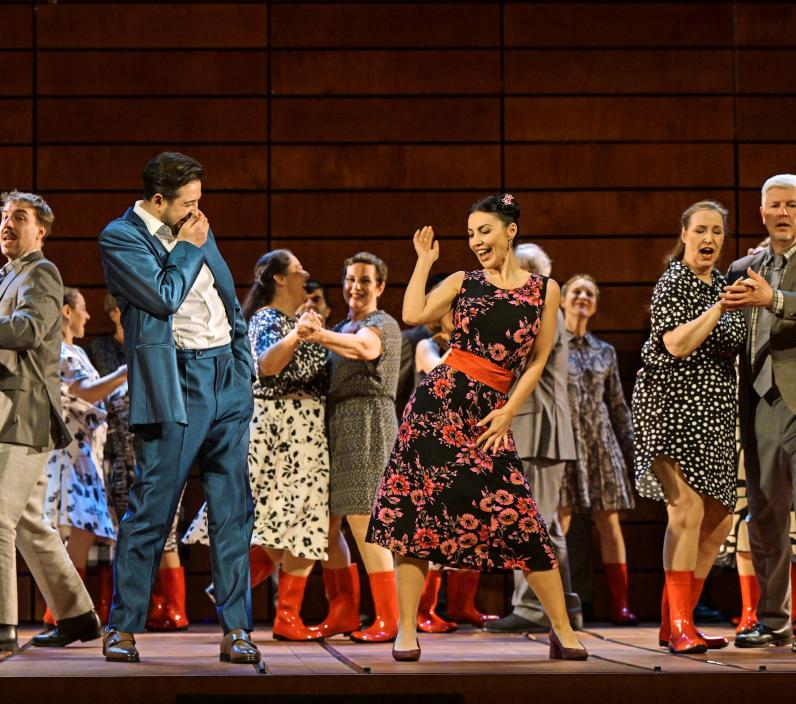
When Eugene Onegin enters Tatyana's orderly life, he appears to her like a character from her novels. The young, inexperienced woman falls head over heels in love with the urbane bon vivant. But he rejects her affection; his restless lifestyle is not suitable for a long-term relationship. Years later, the two meet again. The mature Tatyana has entered into a marriage of convenience with the much older Prince Gremin and has become a wealthy woman. Onegin is shocked to realise that Tatyana would have been the right one for him after all. How will she respond to his passionate confessions…?
Shortly before composing The Maid of Orleans, Tchaikovsky adapted Pushkin's verse novel Eugene Onegin in the late 1870s. Its story of unrequited love mirrored events in the composer’s own life. In May 1877, Tchaikovsky had received a letter from a former Moscow Conservatory student, Antonina Milyukova, who was unknown to him, claiming she had been secretly in love with him for some years. Tchaikovsky appears to have no real feelings for Antonina but had heartfelt sympathy for the unrequited lover, and, through Tatyana, searched for a musical expression to convey with supreme sensitivity the inner torment of the heroine. Tatyana’s transformation, from the deeply serious adolescent of her great letter scene into the mature yet desperately unhappy woman who finally dismisses the man she loves, is one of greatest portrayals in all opera. After Macbeth, German director Michael Thalheimer stages his fourth production for Deutsche Oper am Rhein, creating a world of unfulfilled longings in a society that has grown tired of itself.
CAST
|
Larina
|
Katarzyna Kuncio
|
|---|---|
|
Tatyana
|
Ekaterina Sannikova
|
|
Olga
|
Ramona Zaharia
|
|
Eugene Onegin
|
Bogdan Baciu
|
|
Lensky
|
Ovidiu Purcel
|
|
Prince Gremin
|
Bogdan Taloș
|
|
Filipyevna
|
Ulrike Helzel
|
|
Zaretsky
|
Valentin Ruckebier
|
|
Triquet
|
Sergej Khomov
|
|
Lead singer
|
Mamuka Manjgaladze
|
|
Captain
|
Volker Philippi
|
|
Chorus
|
Choir of the Deutsche Oper am Rhein
|
|
Orchestra
|
Düsseldorfer Symphoniker
|
| ... | |
|
Music
|
Pyotr Tchaikovsky
|
|---|---|
|
Text
|
Peter Ilyich Tchaikovsky
Konstantin Shilovsky
|
|
Conductor
|
Vitali Alekseenok
|
|
Director
|
Michael Thalheimer
|
|
Stage Design
|
Henrik Ahr
|
|
Costumes
|
Michaela Barth
|
|
Chorus master
|
Gerhard Michalski
|
|
Light
|
Stefan Bolliger
|
|
Dramaturgy
|
Anna Grundmeier
|
|
Conceptual preparation
|
Bettina Auer
|
| ... | |
VIDEO
STORY
Act I. Tatyana.
In the countryside, four women spend their time reflecting on their memories and desires. While the widow Larina and the nurse Filipevna soberly evaluate their thwarted expectations of happiness; the young daughters of the house, Tatyana and Olga, look to the future full of optimism. Unlike the carefree Olga, whose marriage to her childhood friend Vladimir Lensky seems assured, the self-effacing Tatyana dreams of a romantic love affair that will transform her life. When Lensky brings the worldly Eugene Onegin with him to visit the estate, Tatyana is convinced that he is just the hero that she has been yearning for. Throwing all convention overboard, she declares her feelings to Onegin. However, he rejects the young woman coolly: his life is constantly changing and unsuited to a lasting relationship. After telling her coldly that she should pull herself together more in future, Onegin abandons the distraught Tatyana.
Act II. Lensky.
Larina hosts a party for Tatyana, to which Lensky again brings Onegin. To everyone’s amazement, Onegin and Tatjana dance together, which prompts talk among the guests of an approaching marriage between the two. Irritated by these rumours, Onegin provokes his friend Lensky by repeatedly asking his fiancée Olga to dance. Lensky is hurt by this and cuts off his friendship with Onegin, challenging him to a duel… in which Lensky is shot by Onegin.
Act III. Onegin.
Years have passed, during which Onegin has tirelessly travelled the world. At a ball in St. Petersburg, he and Tatyana meet each other again. In the meantime, Tatjana has married the highly-decorated Prince Gremin and has risen to become a grand, influential figure in Petersburg society. Shocked by the Princess’s magnificent appearance, Onegin confesses his love for Tatyana. This time, however, it is Tatyana who rejects Onegin: even though she still loves him, she has chosen another life with her husband. Onegin is too late.
INSIGHTS
Like a painting with very fine brush strokes
Interview with conductor Vitali Alekseenok
Pyotr Tchaikovsky deliberately gave Eugene Onegin the genre designation ‘Lyrical Scenes’. What did he mean by this, and how is this reflected in the music of the opera?
I would like to start from a different angle: Tchaikovsky had written at the time about the Maid of Orleans, which was composed directly after Onegin, that he wanted to compose a grand opera, but without the usual things like marches, choral tableaux, etc. In the end, however, his Maiden became exactly that: a powerful work with many large-scale choruses and a thoroughly massive sound effect. For me, Onegin is the complete opposite. In the ‘Lyrical Scenes’ there is an almost chamber music-like intimacy, both in the technical approach and in the positioning of the content. The score is like a painting with very fine brush strokes, everything is drawn with great sensitivity and detail. Although there are a few opulent tutti moments, these serve more as a contrast, to bring out the small and fine elements in an even more refined way. Tchaikovsky introduces us to this lyrical mood from the very first second, when the first violins open the opera with Tatyana's motif: a short, fragile phrase that seems to hover over the entire opera like a melancholy question mark. It is the motif of unfulfilled love and longing that all the characters in Eugene Onegin suffer.
Although a generation younger, Pyotr Tchaikovsky was a contemporary of Giuseppe Verdi and Richard Wagner. Can the influences of these two composers be recognised in his operas?
At that time everything arrived a little late in Russia, because there was no unconditional focus on Western European culture. However, Tchaikovsky was quite well informed. He had worked as a music critic for a while and had closely observed musical developments in Europe. He had also accompanied the first Bayreuth Festival as a journalist, but was rather unenthusiastic about the Ring, as he could not relate to Wagner's monumental compositional style and his ideas of heroism. Verdi's interest in people and his more lyrical approach were closer to his heart, as can be seen from his wish to set Alexander Pushkin's Onegin as an opera. Such material would have been far too commonplace for Wagner!
Where does Tchaikovsky set his own accents compared to Pushkin's novel?
Pushkin's Onegin is certainly more complex, more ambivalent than Tchaikovsky's setting.
There are many different levels in it: on the one hand, there is the plot, then the commentary by a fictional author who is not Pushkin, and then Pushkin's own view of things, which he sometimes allows to shine through. In this way, the reader can constantly decide: Do I sympathize with Tatyana, Lensky and co, or do I maintain the ironic distance of the fictional narrator character? Or is there perhaps a third perspective, namely that of Alexander Pushkin? Such a complex narrative structure is, of course, not possible in an opera libretto, but that was not what interested Tchaikovsky in Pushkin's novel, nor was the satire. In situations that Pushkin comments on with an ironic laugh, Tchaikovsky portrays the bitterness, the inner tragedies behind them; he really suffers with every single one of his characters. This gives the music an emotionality that cannot be described by rational means. It is music to feel, to empathise with, and therein is the big difference to Alexander Pushkin.
Is there a character in the opera with whom Tchaikovsky empathises most strongly?
Clearly with Tatyana! Everything begins and ends with her music, the whole score is musically permeated by the question: ‘What does Tatyana feel in this or that situation?’
She is a sensitive young woman, who has the feeling of being stuck in the provinces, of not being able to get away. Given this she flees into an inner emigration and Tchaikovsky makes this inner world audible and tangible for us all with great sensitivity. It becomes correspondingly emotional when Tatyana falls in love for the first time in her life.
In contrast, Onegin comes across musically as an emotional free rider. Although we meet him as an intelligent man with perfect manners, his music remains strangely meaningless, always a touch off. He allows himself to drift along to where there is liveliness, but produces little liveliness of his own. At the end of the opera when things get really emotional, it is Tatyana's emotionality, not Onegin's, musically speaking. The strongest thing you get from his own feelings is a certain bitterness.
Nevertheless, crucial emotional developments of the characters somehow seem to remain in the dark. How does Tatjana go from being an introverted country girl to the wife of a St Petersburg prince?
We don't find out! The decisive moments of the opera don't happen in the music, but in the silence, in the interval between the second and third acts. I had a phase in my youth when I listened to Onegin every day for about two weeks, I was addicted to this music. At some point, however, I realised that you need a break after the duel between Lenski and Onegin, to realise what has just happened. If you listen to Onegin at home, you should take a break of several hours between the second and third acts, perhaps even a whole day! Only if you experience something yourself in between you will realise the change that happens between the two acts. In the original version, Tchaikovsky had composed 28 bars for the chorus, in which there is still some time to prepare for the ‘new’, rich Tatyana. However, he later deleted her from the score himself, so her appearance as Princess Gremina is totally unexpected not only for Onegin but also for us audience members.
It was important to Tchaikovsky to have the opera premiered at a conservatory - why?
Eugene Onegin is an opera that is particularly popular with young people in Eastern Europe, because it describes all the intense emotions that people experience for the first time at this stage of their lives. Tchaikovsky therefore wanted to work specifically with young people, even though it was not at all easy to find people who were up to the vocal demands of the roles. He wanted his singers to be able to remember what it was like to experience love and heartbreak for the first time. They should not act their roles, but experience them; everything should be as natural as possible and speak directly to the audience. This also contributes to the intimate character of Eugene Onegin.
Gallery
